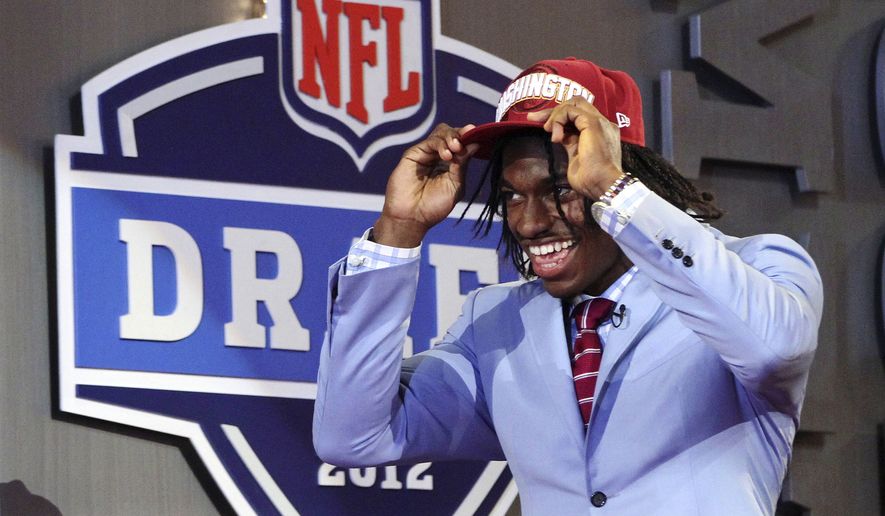ANALYSIS/OPINION:
So there they go, three first round draft choices and a second round pick, right out the door at Redskins Park.
Robert Griffin III has been released by the Washington Redskins, and with his exit go the last reminder of the price this franchise paid for the 2011 Heisman Trophy winner.
The Redskins’ general manager at the time, Bruce Allen, acknowledged the deal to send those draft picks to the St. Louis Rams for the No. 2 pick in the 2012 draft and the chance to pick Griffin III was a “heavy price.”
And that was when the Redskins expected to at least get their quarterback of the future in return. Instead, they got the football version of the Kardashians — a nearly daily drama of dysfunction — and now nothing.
There could have been salvation, though, to save the franchise from the Griffin mistake, save for a few days of timing.
SEE ALSO: Robert Griffin III released by Redskins after four seasons, several ups and downs
The salvation? The $36 million salary cap penalty.
If the Redskins’ crippling salary cap penalty imposed by the NFL for front-loading contracts such as Albert Haynesworth’s in the uncapped 2010 season — against the private wishes of fellow owners, a dubious and questionable action — had been imposed just a few days earlier, it might have saved the franchise.
ESPN reported on March 12, 2012 that the trade “is reversing the plan [coach Mike Shanahan] set in motion last year to stockpile picks to rebuild Washington’s depleted roster. The Redskins, however, have plenty of space under the salary cap and can be aggressive in plugging their holes when free agency begins Tuesday.”
There was this statement issued by Allen and Rams general manager Les Snead: “In order to execute each of our club’s plans for free agency and the upcoming draft, we have agreed to a trade between our two teams for the [second] pick in the 2012 draft. We will submit this trade to the NFL for approval.”
The deal was reportedly made on March 8, but could not be approved until March 13. That day, when the trade for the draft picks went through, the NFL levied sanctions that stripped the Redskins of $36 million in cap space and the Dallas Cowboys lost $10 million.
If we are to believe Shanahan, then the coach, vice president and supposedly final decision-maker in all things personnel with the Redskins, if they had learned about the salary cap decision just a few days earlier — before the trade with the Rams was made — they would not have surrendered the team’s future with three first round picks and a second rounder.
“I don’t think you could have made the deal,” Shanahan told me and co-host Kevin Sheehan in a February 2015 interview on “The Sports Fix” on ESPN 980.
“Any time you’re going to lose two [first-round choices] and a [second-round pick] and you’re going to get penalized like you did [where] obviously, you can’t bring players in, it would be very hard to make that decision,” Shanahan said.
So, if the Redskins’ salary cap penalty had come down a few days earlier, yes, it would have left the franchise crippled with the cap for two years. But they would have not only their first-round pick in 2012 — the sixth selection in that draft — and their first-round picks in 2013 and 2014, in addition to their second-round choice in 2012.
That would appear to have been the better end of the deal.
If the salary cap penalty is imposed days earlier, and Washington backs off the Griffin trade, keeping their draft picks, perhaps Shanahan picks another quarterback in the draft that he liked as well — Russell Wilson.
Instead, the Redskins were hit with a double whammy — loss of cap space and loss of draft picks — with only Robert Griffin III to show for it. And, he just left the building.
⦁ Thom Loverro is co-host of “The Sports Fix,” noon to 2 p.m. daily on ESPN 980 and espn980.com.
• Thom Loverro can be reached at tloverro@washingtontimes.com.




Please read our comment policy before commenting.